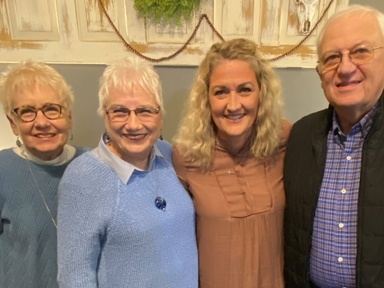
“Keeping it in the family” can imply different things within different families, such as retaining family ownership of a business across generations or keeping a secret from those outside the family unit. For the McClellan family of central Iowa, this phrase pertains to a hereditary eye disease that has afflicted four of their family members and resulted in six corneal transplants since 2017, with two more transplants yet to be scheduled.
Charlotte and Dave McClellan, husband and wife, their daughter, Sherri Carlson, and Charlotte’s sister, Janice Swenson were each diagnosed with Fuchs endothelial corneal dystrophy and each is a patient of Dr. Mark Greiner, associate professor of Ophthalmology and Visual Sciences and Robert and Joell Brightfelt Professor of Cornea Research at University of Iowa Hospitals & Clinics and Iowa Lions Eye Bank medical director. Dr. Greiner has skillfully performed all six of their combined corneal transplant surgeries.
Sherri Carlson was diagnosed with advanced Fuchs dystrophy and underwent bilateral corneal transplants during the summer of 2017, when she was only 47 years old. She was a busy wife and mother of three active teenagers, in addition to providing daycare in their home. Prior to her transplants, she was unable to see to drive at night and colors were muted. As her eyes healed post-transplant, Sherri remembers how emotional she felt as colors became vibrant again and her night vision improved. In letters to both of her donor families, she referred to the return of her vision as being like the scene from “The Wizard of Oz” when Dorothy awakens and opens the door to see the colorful Land of Oz.
Sherri’s aunt, Janice Swenson, also received both of her corneal transplants in 2017, at the age of 74. Two of Janice’s favorite hobbies, beading and cross-stitch, required extremely good eyesight. Her diminished vision due to Fuchs dystrophy was interfering with her ability to work on these intricate, detailed projects that she enjoyed. Being a widow for 16 years, her grandchildren had become an important focus in her life and her failing vision was intruding on her involvement in their lives and activities. Soon after her first transplant, Janice wrote to her donor’s family and expressed how excited she was to create new projects and how thankful she was to be active in her grandchildren’s lives again. In closing she wrote, “My hope for your family is that you are comforted knowing that our gratitude for your gift is not going to be forgotten.”
The McClellan family connection with Fuchs dystrophy did not end there. Due to the hereditary aspect of Fuchs, Charlotte’s eventual diagnosis was almost expected; both her daughter and sister were already afflicted with the eye disease when Charlotte noticed vision problems like theirs and mentioned their family history of Fuchs to her optometrist. Then, a few years ago, Dave began having trouble with night driving and reading. He attributed his problems to an eye injury and resulting surgical repair that occurred in 1986, but Charlotte thought it was worth mentioning to Dr. Greiner. It came as a shock to all of them in August 2019 when Dr. Greiner examined Dave’s eyes and found evidence of Fuchs dystrophy. Dave was family through marriage, not bloodline, which indicated that Fuchs was invading this family from both sides. Dr. Greiner said, “Fuchs endothelial corneal dystrophy is the leading indication for corneal transplant surgery in the U.S – and for Iowans as well. Although Fuchs dystrophy is common and does run in families, encountering such a unique situation with Fuchs on both sides of the family is decidedly uncommon.”
Charlotte and Dave each received their first corneal transplant at UIHC earlier this year. Dave’s transplant occurred on August 11 and Charlotte’s took place just a few weeks later. Late last month, both Charlotte and Dave sent heartfelt letters of thanks to their respective donor families and mentioned their unique family connection to this sight-diminishing eye disease. Dave wrote, “How generous and thoughtful of you and your loved one to donate corneas. I have greatly benefited from the new cornea and I hope this will be a source of comfort to you.” Charlotte shared, “I have a hereditary eye condition that causes the cornea to thicken and results in blindness. My sister, daughter and husband also have this eye disease and we have all had one or both corneas replaced. Therefore, our entire family is extremely grateful for people and families like yours that make the difficult decision to donate organs from their loved ones so that others may experience improved quality of life.”
Regarding Fuchs dystrophy, while the McClellans are “keeping it in the family,” their immeasurable gratitude for the selfless donors and donor families who have generously given the gift of sight is something they choose to share far and wide, especially during Eye Donation Month.
